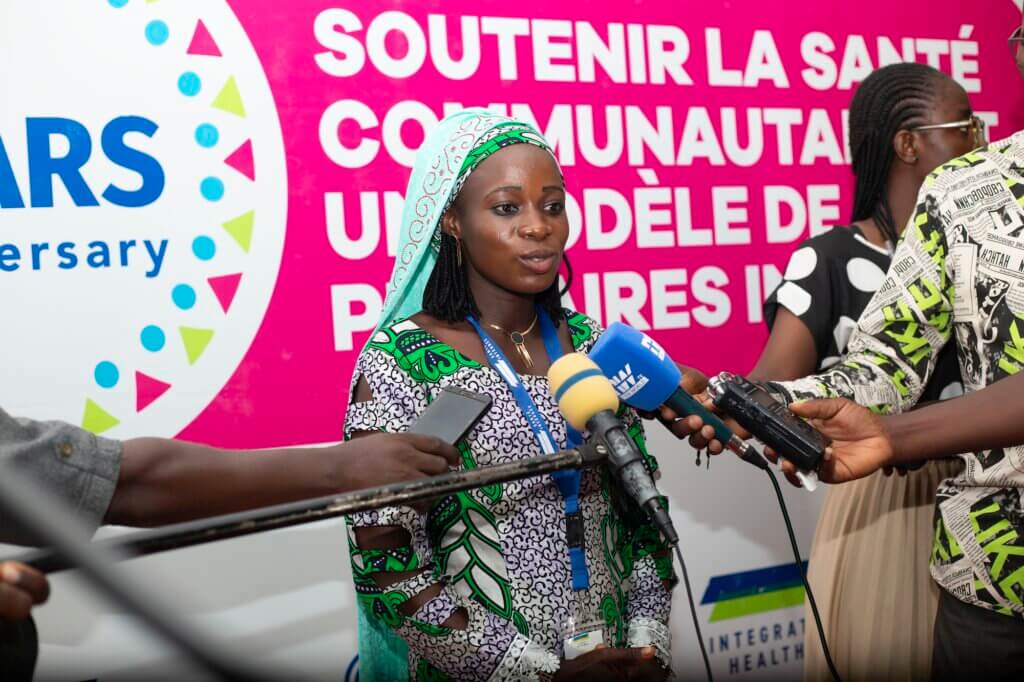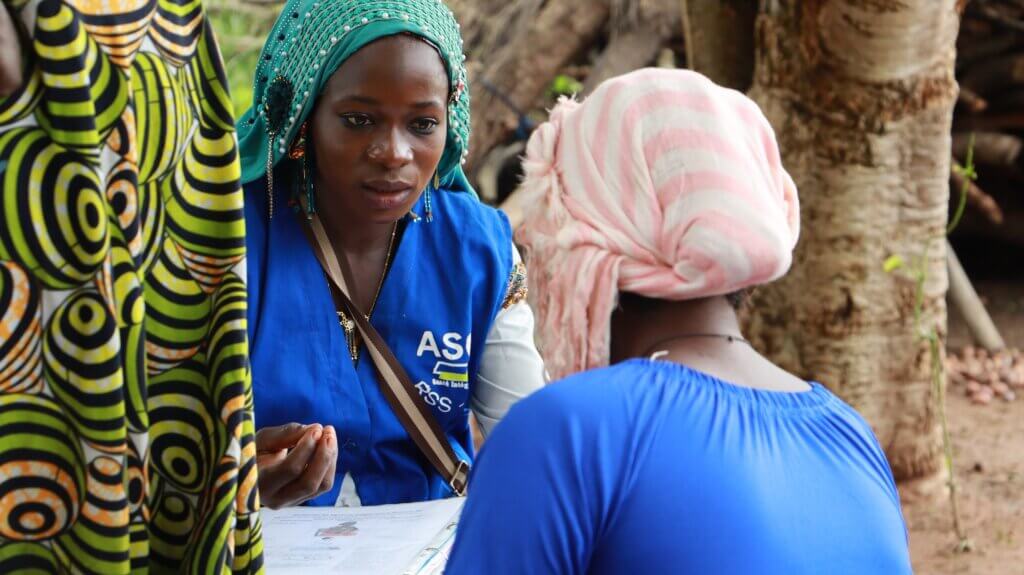Djarietou Aboubakar beamed as she accepted the award on stage. Representing her fellow Community Health Workers (CHWs) at Integrate Health’s 20th anniversary celebration, it was clear that her work filled her with pride. I watched after the ceremony, as she fielded questions from a gaggle of media reporters. Standing before the swarm of microphones being thrust in her face, she was poised and polished. Her professional demeanor as an advocate, was the same as when she delivers lifesaving care to her neighbors. Djarietou brilliantly demonstrates why CHWs like her are increasingly recognized as an invaluable component of the continuum of quality primary healthcare delivery.

The momentum driving the adoption of professional CHW cadres across Sub Saharan Africa is long overdue and represents one of the greatest opportunities to drive down, even eliminate, preventable deaths of women and children across the continent. As I have previously written, investment in CHWs as part of comprehensive primary healthcare is a best bet, and an absolute prerequisite to achieving Universal Health Coverage (UHC).
While this view remains unchanged, I have grown increasingly concerned about the gendered barriers that women CHWs face in their roles. Simply put, the health outcomes we aim to achieve will not be possible without a much greater emphasis on ensuring gender equity.
The triple burden: Barriers at home, in the community, and in the workplace
Djarietou was selected by her community following a competitive recruitment process. From the start, she had the unwavering support of her husband, who encouraged her to pursue this opportunity and even initiated the process for her recruitment. He continues to help manage their household when her work keeps her occupied. However, this level of support is not universal among her colleagues. Many CHWs face resistance from their husbands, who struggle to accept their roles and responsibilities outside the home.
Djarietou felt a similar degree of resistance when she stepped out into the community. “Many husbands yelled at me, threatened me [for providing family planning], and told me not to return or there would be consequences,” she shared. Djarietou had to harness her own courage and deploy careful strategies, often with the support of her male colleagues, to overcome these barriers. She collaborated with male peer educators, a cadre specifically created to compliment the work of CHWs, to gain greater acceptance of family planning in her community. “It took time, patience, and support from male peer educators to convince others in my community. And for me, it took a lot of determination to keep going.”
Djarietou’s story highlights what Gavi CEO, Dr. Sania Nishtar refers to as the triple burden facing women CHWs at home, in their communities and in their work. At home, women often carry a disproportionate share of household responsibilities, which complicates their ability to meet professional obligations. Families sometimes view women’s involvement in healthcare with suspicion, making it harder for them to work freely. In their communities, women CHWs encounter cultural resistance and sometimes outright hostility. Their work in areas like family planning may provoke backlash from men who feel their presence challenges traditional roles, leading to harassment, threats or worse. These experiences not only affect their well-being but can also limit their effectiveness in delivering essential health services. The workplace itself presents further barriers. With large workloads, sometimes limited training, and inadequate support, women CHWs can feel overwhelmed, isolated and undervalued. These systemic obstacles can lead to burnout, turnover, and diminished mental health.
Djaretou’s journey mirrors the challenges that many women CHWs, and women in general, face worldwide: empowerment in patriarchal societies often meets resistance, testing the system and a woman’s resolve. However, we know how to solve these challenges. By intentionally designing community health systems to recognize and mitigate these risks, we can ensure the health equity outcomes we seek to achieve and protect the women we rely on to achieve them.

Why gender equity is essential to health equity
At its core, health equity requires gender equity. When health systems empower and protect women, as patients and providers, they’re more capable of meeting the diverse needs of communities leading to better health outcomes. Integrate Health’s vision is to support women CHWs as agents of change, empowered and respected for their contributions. The road will be long, even for us. But we won’t shy away because it’s hard, or because funding is scarce.
We started this commitment with Last Mile Health when we launched our Gender Equity Framework for Action, which features 16 actionable recommendations to address the gender-based challenges that women Community Health Workers face across their careers. But this framework is only a first step. Now we aim to go deeper.
Alongside our partners, we will continue to actively listen to women CHWs, with an aim to deepen both understanding and documentation of the depth and breadth of the challenges they face. Ultimately, our goal is the adoption and implementation of solutions to make community health systems truly gender responsive. Through these measures, we can envision a redefined model of empowerment—one that balances opportunity with protection and builds systems that prioritize both safety and respect for all.
Integrate Health is committed to leading by example. But achieving true equity requires more than one or even a few organization’s commitments. Today, national policy reforms, which recognize professional CHWs, are being adopted across the African continent, and funders are changing policies to allow for payment of professional CHWs. The wind is shifting, and we can’t lose this momentum. We call on funders, policymakers, and other health organizations to join us in creating systems where women can work without fear of harm or discrimination, where they are safe, secure, and empowered to thrive.
As Djarietou continues her work, supported by a network of actors that understand her challenges and celebrate her contributions, she and her fellow CHWs are proof that true empowerment begins with support and protection. Together, we can break the cycle of normalized discrimination and violence, creating a future where no woman has to face these challenges alone. In doing so, we can realize our goal of universal health coverage and achieve our vision of health for all.
